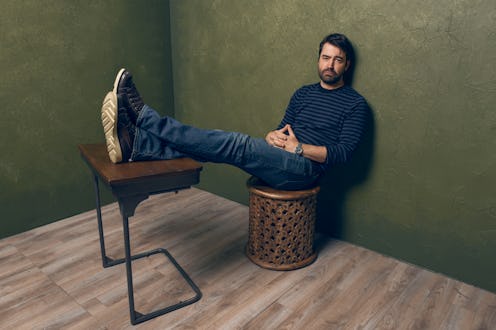Entertainment
Ron Livingston on Why He Pities Journalists
You know him as Sex and the City's Berger — the one that broke up with Carrie via Post-it: "I'm sorry, I can't, don't hate me." These days, Ron Livingston is utilizing his talents for more than HBO sitcoms. The 47-year-old actor and his wife, actress Rosemarie DeWitt, are taking independent cinema by storm. At Sundance Film Festival, the actor has three films under his belt — Joe Swanberg's Digging For Fire, the ultra-dark drama James White, and James Ponsoldt's latest offering, The End of The Tour starring Jason Segel. In the Jason Segel-led film, Livingston plays a magazine editor at Rolling Stone. "I don't envy anybody who's a magazine editor these days," he says. "In real life paper print, it seems like that's a big hill to climb."
The End of the Tour is the true story of Rolling Stone journalist David Lipsky's five-day interview with enigmatic writer David Foster Wallace. The story tackles the idea of ownership of ideas and perspectives in journalism. "You know, it's funny, I think there's a real wrestling between the author of a piece and the subject of a piece over who gets to tell the story," he says. "Who's story is it? If you're writing a piece on me, is it my story or is it yours?"
For David Foster Wallace, this push-pull dynamic between journalists and himself was ever-present. "I think probably the reason Wallace was so cantankerous about it, is as a writer himself he really knew the power that the writer had in that situation," Livingston says of the five-day long interview. "He wielded that power like crazy, like hardly any other, maybe Hunter S. Thompson."
The narrative, which is based off Lipsky's memoir, took place in 1996. And Livingston, like many others, sees print journalism as a different beast than it was nearly 20 years ago. "I think as a journalist you're supposed to really distance yourself, like the old Walter Cronkite theory of it anyway, which is not only are you not the story, but you're not even supposed to leave your shadow on the story." But the actor is quick to add: "I don't know if we believe that that is true anymore. I think Wallace certainly didn't believe that."
Unlike his notebook-toting character, Livingston doesn't want to go near the real world of journalism any time soon. "I guess I pity journalists because A) I don't know where any of you are going to work anymore," he says. "And B) I think people are still trying to figure out what journalism is going to look like in 20 years. Is it objective reporting or is it just glorified blogging? What the hell is it? So... good luck."
Image: Getty
